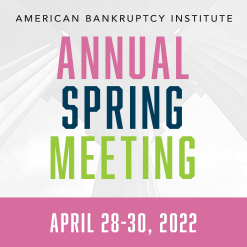| |
| |
| vol 21, num 1 | March 2022 |
| |
|
|
| |
|
|
|
|
|
| |
| How Subchapter V Trustees May Exercise Derivative Standing |
| When Congress passed the Small Business Reorganization Act of 2019 (the SBRA), they made two important changes to chapter 11. First, Congress created the subchapter V trustee. Second, Congress eliminated the mandatory appointment of a committee of unsecured creditors.
Historically, creditors’ committees have played an important role in conventional chapter 11 reorganizations. When a debtor-in-possession unjustifiably refuses to bring a cause of action because of a conflict of interest or otherwise, a creditors’ committee can step in to assert the claim for the benefit of all creditors. Also known as derivative standing, this practice plays an important role in ensuring that a chapter 11 estate is not diminished by a DIP’s potential conflicts of interest.
|
| |
|
|
|
|
| |
|
| |
| Varieties of Mootness: Constitutional and Equitable Mootness After Sundaram and VeroBlue |
| The term “mootness” refers to a category of related precepts that preclude a reviewing court from reaching the underlying merits of a controversy. While questions dog this doctrine’s constitutional and prudential forms outside of the Bankruptcy Code’s ambit, few doubt either’s general validity. However, within bankruptcy’s periphery, more substantive questions abound. There, constitutional mootness’s recognizable form blurs, and the prudential doctrine dubiously known as equitable mootness resists pragmatic simplification. |
| |
|
|
|
|
| |
|
| |
| Recent Interpretations of “Reasonable Due Diligence” Under Section 547(b) |
| In May 2021, the ABI Journal examined the recently-added “reasonable due diligence” requirement of 11 U.S.C. § 547(b), with an in-depth analysis of how such a requirement may shift the burdens of proof assigned in 11 U.S.C. § 547(g). Since the revision’s enactment, several courts have examined the new language, shedding light on what is required under this new standard in the real world.
Section 547(b) provides that, “[e]xcept as provided in subsections (c), (i), and (j) of this section, the trustee may, based on reasonable due diligence in the circumstances of the case and taking into account a party’s known or reasonably knowable affirmative defenses under subsection (c), avoid any transfer of an interest of the debtor in property …” Yet, in § 547(g), Congress assigns the trustee “the burden of proving the avoidability of a transfer under subsection (b) [of § 547], and the creditor or party in interest against whom recovery or avoidance is sought has the burden of proving the nonavoidability of a transfer under subsection (c) [of § 547]”, which sets forth available affirmative defenses. In addition to this potential shift of burden, whether or not the new language creates heightened federal pleading requirements has been a hot topic in
its examination.
|
| |
|
|
|
|
| |
|
| |
| A Potential Alternative to Approving Consensual Third-Party Releases: § 1141(a) of the Bankruptcy Code |
| The approval of third-party releases in connection with the confirmation of a debtor’s chapter 11 plan before a bankruptcy court has become increasingly controversial and the subject of several recent district court decisions. At the insistence of nondebtor parties, third-party releases are often included in a plan of reorganization or liquidation to shield such parties from claims — related to the debtor, its business and/or the restructuring — brought by the debtor’s creditors, equity securityholders and other stakeholders.
Historically, courts approve third-party releases in instances where the release is consensual. In considering these releases, courts apply traditional contractual principles to determine whether a creditor or interest-holder in fact “consented” to the third-party release. Over the last several years, courts even within the same district have had differing views as to what showing is required for a release to be deemed consensual. For example, several courts require creditors to affirmatively opt in to the third-party release, while others conclude that opt-out provisions are satisfactory to manifest a creditor’s consent to be bound by the release. As a result, there is a growing lack of clarity as to what is required to obtain the creditor or interest-holder’s consent.
An alternative framework relied upon by courts when analyzing the approval of consensual third-party releases appears to be emerging under § 1141(a) of the Bankruptcy Code. On Oct. 27, 2021, the Delaware Bankruptcy Court in In re AH Liquidation Inc. approved a third-party release over objections filed by the U.S. Trustee and another creditor. In approving the third-party release containing an opt-out mechanism, Judge Goldblatt concluded that the applicable standard for approval is included in § 1141(a) of the Bankruptcy Code rather than the contractual standard of consent. |
| |
|
|
|
|
| |
|
|
|
|
|
|
|
|
|
| |








